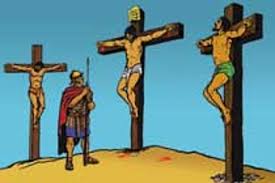John 12:27 – "Now is my soul troubled. And what shall I say? 'Father, save me from this hour'? But for this purpose I have come to this hour."
In our last post, Jesus assured his followers that his kingdom was about to be established. However, it would not occur with the power and splendor they were expecting. Rather, it would come about through his suffering and death.

Jesus used the analogy of a seed to help them understand his point. A seed cannot grow into a plant and produce a harvest unless it first dies. This is a reflection of what will occur in the spiritual realm. Through the death/resurrection of Jesus, the souls of both Jews and Gentiles will be harvested for the kingdom of heaven.
Jesus encourages his followers to be strong in their faith, because they too may be called upon to suffer or even die for the kingdom of heaven (John 15:20). Here is a comforting thought: Jesus does not call upon us to do something that he himself would not do!
'Now is my soul troubled' - This teaching leads Jesus to the reality of his own upcoming suffering and death. The thought of these imminent events filled him with dread and troubles his heart/soul. Contrary to what we may think, it was not the excruciating physical pain that distressed Jesus the most.

In order to make atonement for our sin and appease the wrath of God, he had to take upon himself all of the sin/guilt of the entire human race. Think about that – the wrath of God that resulted from the sin of billions and billions and billions of people was laid upon Jesus. By taking our sin upon himself, Jesus experienced the dreadful judgment of God; he was completely separated from his Father. The torment he endured in this respect was much more severe than any physical pain he experienced.
'And what shall I say? Father save me from this hour?' – It is perfectly natural for a human to cry out 'Father save me' when he experiences horror/fear due to a sudden or violent calamity. For instance, if you were in a car going 75 mph and you saw that a collision with another vehicle was going to happen, it would be natural for you to cry out 'Father save me' because you would want God to spare you from pain and death.
But 'Father save me' would not be a proper request if it came from Jesus. The whole purpose of his life on earth was to bear the wrath of God for the sin of mankind by dying on the cross.
Romans 5:8-9 - But God commends his love toward us, in that, while we were yet sinners, Christ died for us. Much more then, being now justified by his blood, we shall be saved from wrath through him.
Therefore, to ask the Father to spare/release him from his appointment with death and torment would have been against the will of the Father; and Jesus never did anything that was contrary to his Father's desires. This is confirmed in the prayer of Jesus in the Garden of Gethsemane:
Matthew 26:39 - And he went a little farther, and fell on his face, and prayed, saying, O my Father, if it be possible, let this cup pass from me: nevertheless not as I will, but as you will.
What a powerful example! Our weak human nature will automatically shrink/draw back at the possibility of suffering, but Jesus tells us not to yield to the flesh. In fact, he leads us by example, fully accepting the suffering that the cross held for him. We too should submit ourselves to the will of God, knowing that if we suffer it will not be in vain. God will do a mighty work through our suffering.
John 12:28 – "Father, glorify your name." Then a voice came from heaven: "I have glorified it, and I will glorify it again."
In this passage, Jesus is teaching us the lesson of humble, willing submission to God's divine will.
Let me ask you this: Is it possible to unwillingly and/or haughtily submit to authority? If so, how might that present itself? Consider this example:

Suppose you were employed in a business that didn't work holidays. But all of a sudden, without any notice, your boss scheduled you to work on Thanksgiving and the Friday afterward. The last thing you wanted to do was work those two days, but since you didn't really have a choice, you did it.
What would your attitude be on that day? If it were me, I would start the day angry. I would be complaining on my way there. I might snap at the customers, or answer the phone rudely. I would definitely do the least amount of work possible. And I would grumble about the boss and the unfairness of the situation for weeks to come.
In this scenario, it's true that I submitted to the authority of the boss, however, you might say I was unwillingly obedient. I also disrespected the boss and bad-mouthed the company. Obviously, it is possible to stubbornly or unwillingly submit to authority. We've probably all done it at one time or another.
But this was not the case with Christ. In fact, his statement (Father, glorify your name) expresses the opposite of an angry, unwilling, stubborn surrender to the will of God. Instead, he fully and completely consecrated his suffering to the glory of God; he was willing to endure any trial and submit to all suffering so that the name of his Father could be honored above all else.
In response, God declares two things to be true: He had glorified his name, and he would glorify it again. What did he mean by that?

In a broad sense, these words are without limit; they refer to the entire past and the whole future of God's revelation of himself to mankind. But more specifically, God has been glorified in the life of Christ, through his doctrine and his miracles. His earthly life exemplified God's wisdom, power, truth, holiness and goodness.
And that's not all… God will finish what he started. He will again glorify his name in the future through the suffering, death and resurrection of Christ. These actions glorify both the justice and mercy of God. They fulfill the demands of the broken law and they satisfy the insult and offense of sin to God's government while purchasing forgiveness for mankind.
Hallelujah! We could sing of the glory of God and the work of Jesus for all of eternity!
John 12:29 – The crowd that stood there and heard it said that it had thundered. Others said, "An angel has spoken to him."
When Jesus said, 'Father, glorify your name' it was a cry or a petition to his Father. We should not be surprised at all when the Father answers his beloved Son; God always answers prayer (Psalms 65:2, Proverbs 15:29).
But notice that those who heard it heard different things.

There were surely some among the multitude that were spiritually awake and able to receive this divine revelation of God. They heard what God said. It strengthened their faith. They were able to testify/witness to it later on, after Jesus rose from the grave.
Others chose to ignore the message of God and focus on the sound of the thunder. Thunder and even lightning are frequently associated with the voice of God (Exodus 19:16-19, Revelation 4:5, Revelation 8:5, etc). However, the way the message is delivered is secondary to the message itself. Those who focused on the thunder were deaf to the message it delivered.
Still others found the voice articulate, even though they did not understand what was said. These people attributed the voice to an angel; it was the general opinion of the Jews that when God spoke directly to his people he always used an angel to deliver the message.
Despite their differences, they all agreed on one thing – the sound was real, and it came from heaven. And whether they wanted to admit it or not, the answer was a confirmation of the work, ministry and office of Jesus. There was simply no basis for the Jews to continue to deny that Jesus was the Messiah.
Here is an interesting fact: Scholars have noted that a voice from heaven testified/confirmed/endorsed Jesus on three separate occasions:
- When he began his public ministry as the high priest of the new covenant – Matthew 3:17
- When a command was given for his disciples to listen to him as the great Prophet of the church – Matthew 17:5
- When he enters Jerusalem and is identified as our King – John 12:28-29
Thus, God (with his own voice) confirmed Jesus as Prophet, Priest and King.
Let me ask you this: If God spoke to unbelievers/scoffers in an audible voice today, would the results be any different? Personally, I don't think so. In my opinion, there would still be some people who received his word, some who would hear yet ignore it, and some who would miss the point completely. What do you think?
Fortunately for us, God is still speaking to his children, using dreams, visions, inner confirmations, his written word and other ways as well (John 10:16,27). How does he communicate with you?
John 12:30 – Jesus answered, "This voice has come for your sake, not mine."
If Father God wanted to give an encouraging word directly to his Son, he could have done it privately. He could have come to him in a vision or a dream. He could even have whispered something directly in Jesus' ear. But he didn't – because God was speaking to the Jews and Greeks, not to his Son.
As Jesus explains, the only reason for the audible voice of God was as a witness/testimony to the people who were present in the temple that day.
The audible voice of God confirmed the office and ministry of Jesus. Regardless of what the religious leaders claimed, there could be no doubt that God had sent Jesus into the world as the long awaited Messiah. Therefore, the Jews and Greeks should accept Jesus, submit to his teachings and then rest in the assurance that he was their Redeemer and Savior.
This word from Father God was also intended to strengthen and confirm the faith of the people. The crucifixion was going to occur in a matter of days; the faith of the people would be tested and shaken. So God graciously sent them his word as an assurance that Jesus was the true Messiah – no matter how it looked at that moment.
John 12:31 – "Now is the judgment of this world; now will the ruler of this world be cast out."
Jesus now goes on to expound on the manner in which his death will glorify God. It is the will of God for everyone to be a part of his eternal kingdom; he does not want anyone to be lost.
2 Peter 3:9 - The Lord is not slack concerning his promise, as some men count slackness; but is long-suffering toward us, not willing that any should perish, but that all should come to repentance.
But in order for people to come into his kingdom, the price of sin must be paid and the power of Satan must be broken.
The phrase 'ruler of this world' (your translation may say 'prince of this world') was the normal Rabbinic title for Satan.

Satan gained dominion/authority over mankind by the fall of Adam (Romans 5:12). Ever since, he has kept all men under the slavery and tyranny of sin. He is a usurper who acts like a prince, operating in a kingdom of darkness and evil. He opposes the kingdom of heaven at all times, blinding the eyes of mankind to the truth of the gospel (II Corinthians 4:4) and tempting them to do evil. He spreads lies and wickedness through his servants, the children of disobedience (Ephesians 2:2). He has a firm grip on this world, seeking to destroy or devour any righteous person (I Peter 5:8).
And as we know, mankind had no hope of ever escaping from the shackles of sin.
But the time had come for scripture to be fulfilled; the judgment decreed for Satan was about to be carried out.
Genesis 3:15 - And I will put enmity between you and the woman, and between your seed and her seed; he shall bruise your head, and you shall bruise his heel.
When Jesus died and rose again, the power and authority of Satan was destroyed. Mankind could be free from the burden of sin through the blood of Christ; he could now choose to be part of the kingdom of light (Colossians 1:13-14). He could be reinstated into fellowship with the Creator.
Because the actions of Jesus made this possible, his death and subsequent resurrection glorify Father God.
Although the power of Satan was broken by Jesus 2000 years ago, his reign over mankind did not instantly cease (obviously). But know this - Satan was vanquished at that time and his kingdom has been in decline ever since. Eventually, when the appointed time comes, Jesus will return to earth and put a final end to his kingdom forever.
Habakkuk 2:3 - For the vision is yet for an appointed time, but at the end it shall speak, and not lie: though it tarries, wait for it; because it will surely come, it will not delay.
If Jesus glorified God by doing his will, we can glorify God in the same way. What is God's will for your life? Are you willing to pursue that course even if suffering is involved?
John 12:32-33 – "And I, when I am lifted up, from the earth, will draw all people to myself." He said this to show by what kind of death he was going to die.
The Jews understood the phrase 'lifted up from the earth' to mean death (specifically, to die or be put to death). John plainly tells us that this was the correct interpretation of the phrase.
The Jews (and Satan) believed that crucifying Jesus would not only shut him up, it would result in everlasting shame and contempt of his name and life (Deuteronomy 21:23).

Little did they know that Christ crucified is the 'hope of glory' for the world (Colossians 1:27). Hanging Jesus on a cross between heaven and earth only further promoted the glory of the Father. Through the cross, the preaching of the gospel and the power of Holy Spirit, Jesus has drawn innumerable multitudes of men and women to himself. Jesus used the shame of the cross to bring eternal life/salvation to all who put their faith in him.
What did Jesus mean when he said he would draw 'all people' to himself?
In order to fully understand the meaning, we must remember the context of the statement. Jesus is in the temple, teaching. He can see the stone wall of separation between the Jews and the Greeks/Gentiles and he knows the Gentiles greatly desire to meet him. He is very aware of his upcoming sacrifice on Passover; his time of suffering was drawing near. But he was also acutely aware that his suffering would not be in vain. Through it, 'all people' – Jews and Greeks/Gentiles – could be free from the curse of the law.
Galatians 3:13 - Christ has redeemed us from the curse of the law, being made a curse for us: for it is written, Cursed is every one that hangs on a tree:
Freedom from the curse of the law was not limited to the Jewish people; God had something much, much greater in mind. The door of salvation was blown wide open by the sacrifice of Christ and Gentiles were also admitted to the kingdom of heaven.
As we previously mentioned, God will certainly be glorified by the sacrifice of Christ. At the same time, he will glorify his Son, giving him a name above all others:
Philippians 2:9-11 - Therefore God also has highly exalted him, and given him a name which is above every name: That at the name of Jesus every knee should bow, of things in heaven, and things in earth, and things under the earth; and that every tongue should confess that Jesus Christ is Lord, to the glory of God the Father.
God will also glorify Jesus by making him the head of all things, including the church (Ephesians 1:15-23).
John 12:34 – So the crowd answered him, "We have heard from the Law that the Christ remains forever. How can you say that the Son of Man must be lifted up? Who is this Son of Man?"
The Jews in the temple that day were contrary and hostile. Despite having heard the audible voice of God, they immediately looked for ways to dismiss Jesus as the Messiah. Their excuse for rejecting him was based on teaching by the religious leaders.
Specifically, the religious leaders taught them to believe that the Messiah (the Christ) would not die; he would reign forever. These teachings were based on many Old Testament passages including Psalms 110:4, Micah 4:7, Isaiah 9:7, Daniel 2:44 and others. This teaching wasn't wrong (Jesus will reign forever), but it was definitely an incomplete picture of what was prophesied about the Messiah.

It seems that the teachers of the law had overlooked other important Old Testament texts that spoke of the suffering and death of the Messiah, like Isaiah 53.
The argument of the Jews went something like this: If Jesus was the Messiah, and the Messiah would rule forever/never die, then how could Jesus be 'lifted up'? In other words, they did not believe that the death of Jesus could be reconciled with the idea of his eternal reign.
The problem is that they did not understand (or they refused to understand) the true nature of the Messiah and his kingdom. Jesus was both divine and human. Though his human body died, his Spirit/divine nature did not. After his suffering and death, his spirit and body were once again united during his resurrection and from that point onward he would rule/reign forever. In short, death of the body does not mean death of the spirit.
The same thing is essentially true for us. One day, our body will die. But physical death does not kill our spirit, it merely frees it from our sinful flesh. At some point, God will give each of us a new body fit for eternity in his kingdom. Our spirit and new body will be united and endure forever.
John 12:35 – So Jesus said to them, "The light is among you for a little while longer. Walk while you have the light, lest darkness overtake you. The one who walks in the darkness does not know where he is going."
Jesus reproves the unbelieving crowd for their frivolous reasoning. In truth, they already knew the answers to the questions they asked. They were well aware that man dies yet his immortal soul continues to live on. So Jesus warns them not to shut their eyes against the spiritual/gospel light he is bringing them (John 9:5).
At that very moment, the Jews were definitely walking in the light. They had Christ's bodily presence, they heard his preaching, they saw his miracles and they heard his Father speak. If there was ever a time for them to commit to the gospel in faith, it was right then!

As Jesus warned, that light would soon seem to vanish away. Jesus was going to be crucified. Spiritual blindness and hardness of heart would fall upon the Jews (Romans 11); the kingdom of God would be given to the Gentiles/Greeks. In a few short years the temple would be destroyed and the Jewish nation dissolved. For the people present in the temple that day, time was short and it was imperative that they walk in the light/truth of the message of grace.
If they don't walk in the light, the only other choice is to walk in spiritual darkness. Those who do have no idea where they are going, or what they are doing. They no longer recognize the difference between good and evil. They endlessly wander the paths of life living in sin and error. They are on the way to destruction and hell without even realizing it.
John 12:36 – "While you have the light, believe in the light, that you may become sons of light." When Jesus had said these things, he departed and him himself from them.
After this conversation, Jesus withdrew outside of Jerusalem. He most likely went to the Mount of Olives or the gardens at its base where he spent the night on many occasions.
It was his custom to spend the night there, and return to Jerusalem in the mornings to teach and preach.
Let me offer you some encouragement, relief and strength:
Jesus tells us that his life can be compared to a seed. A seed must be buried and die before it can bring life to the plant and produce a harvest. In the same way, Jesus must die and be buried so that he can bring the church to life and bring an abundance of believers into the kingdom of heaven.
Death is a requirement of every Christian as well. We must die to sin and to our own selfish nature, taking up the cross of Christ and following wherever he may lead.
Mark 8:34 - And when he had called the people unto him with his disciples also, he said unto them, Whosoever will come after me, let him deny himself, and take up his cross, and follow me.
Just like Jesus, we have the assurance that any suffering we endure will not be in vain. God will reward it when he reconciles all things at the end of this age. So let me end by speaking a word of blessing over your life – the same one given by the author of Hebrews:
Hebrews 13:20-21 - Now the God of peace, that brought again from the dead our Lord Jesus, that great shepherd of the sheep, through the blood of the everlasting covenant, make you complete in every good work to do his will, working in you that which is well pleasing in his sight, through Jesus Christ; to whom be glory forever and ever. Amen.
